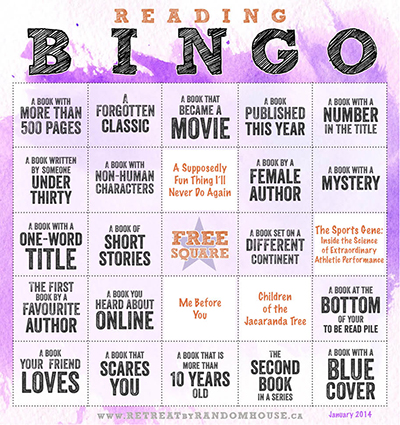Just as I was about to embark on this challenge, I read a great post over at Book Riot the other day about throwing reading plans and challenges and lists out the window, and just reading what you want, when you want. As much as I am compelled to follow a structure, that approach also makes sense to me – seeing as how my wish list is longer than I’ll ever get through in three lifetimes, and thinking about all those amazing books that I’ll never read depresses me. So maybe my challenge for 2015 will be to avoid challenges!!
But for now, on we go with Reading Bingo. Off to a big start, I’m applying four of the books I read in January to the card:
A best-selling book:
Me Before You, by Jojo Moyes
(Paperback, 400 pages, Published July 30, 2013 by Penguin Books, first published January 2, 2012))
3 stars
A New York Times bestseller, with over one million copies sold – I think it qualifies for this square! This is one of those books that I liked, but that a lot of people I know will love. So I say, read it, and love it! Story was good, characters were well done, it didn’t fail at the end, and it raises such powerful questions that it’s no wonder book clubs are having a field day with it. But, the writing was a little too flat/simplistic/lacking in “oomph” for me to give it that extra star or two.
A funny book:
A Supposedly Fun Thing I’ll Never Do Again: Essays and Arguments, by David Foster Wallace (Paperback, 353 pages, Published February 2, 1998 by Back Bay Books (first published 1997))
4 stars
And so but I really shouldn’t read David F. W., whom I consider an Extraordinary Writer, any more, because although this book was indeed funny, not jokey funny but sometimes funny in an uproarious sort of way and very often in a droll sort of way that is really E.W.’s specialty and which is, I have no doubt, inimitable, and although I delighted in reading it, except for the parts on theoretical literary criticism that went over my head and the watching of Lost Highway[1], and although it is a veritable treat for a logophile[2] by way of including words like “boviscopophobia[3],” w/r/t why I should no longer read E.W. it’s because for a short while after afterwards I imagine that I have absorbed just a smidge of that extraordinary wordage and am able to fashion glorious and eloquent locutions that by anybody else are clunky run-on sentences that would make a grade school teacher wince but from the pen of D. Foster Wallace are sublime feats of phraseological acrobatics. And, clearly, I am not.
[1] A not very good – and a very David Lynchian – movie, about which D. Foster Wallace wrote an essay after spending a few days on set during filming. And the essay is in this book. And so I watched the movie. Verdict: the essay was highly enjoyable; the movie, not so much.a
aD.F.W. would never have used as lazy and vapid a phrase as “not so much.”
[2] I’m sure a true logophile wouldn’t have had to look up quite as many words in her trusty ol’ Canadian Oxford (or dictionary of choice) as I did. But, that is part of the fun of reading this E.W.
[3] I have this!
A book based on a true story:
Children of the Jacaranda Tree, by Sahar Delijani
(Hardcover, 288 pages, Published June 18, 2013 by Atria Books (first published January 1, 2013))
4 stars
Based on the true story of the author’s birth in Tehran’s Evin prison in 1983, the novel starts there and then explores the long and dark reach of that hideous spot through time and place and generations. Very beautifully done! (If you like to pair up works of fiction and non-fiction on the same subject, try Marina Nemat’s magnificent Prisoner of Tehran.)
A book of non-fiction:
The Sports Gene: Inside the Science of Extraordinary Athletic Performance, by David Epstein
(Hardcover, 338 pages, Published August 1, 2013 by Current Hardcover; audio book from audible.com)
4 stars
So, apparently, super models may “suffer” from a genetic mutation that gives them those wondrous proportions. Makes you feel better, right?! That’s just one of the tidbits I picked up in The Sports Gene. Don’t be too put off by the title if you’re not a sports fan. While professional sports and individual athletics form the theme of the book that pulls the various points and anecdotes together, it’s also an interesting bigger-picture look at anthropology – how humanity evolved and what that means for the future of how we train. (Note to fans of Malcolm Gladwell: You are hereby forewarned that Epstein – like many other authors of sociology books I’ve read in the last couple of years – takes issue with Gladwell’s writings, in this case the “10,000 hours rule” as he popularized it.)
That’s it for January! See you next month!
Current to-read-pile count: 21. Yikes!

